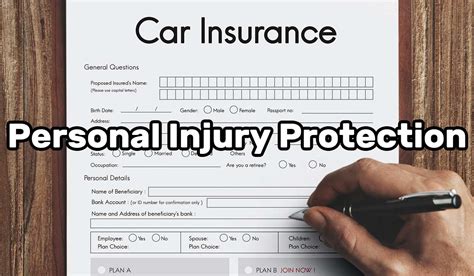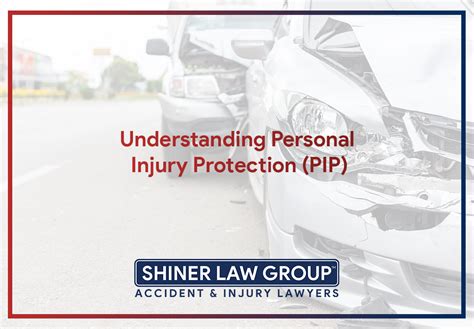Car Insurance Personal Injury Protection

Personal Injury Protection (PIP) is a crucial component of car insurance policies, designed to provide financial coverage and support for policyholders and their passengers in the event of an accident. This no-fault insurance benefit offers a safety net to cover medical expenses, lost wages, and other related costs, ensuring individuals can focus on their recovery without immediate financial strain. In this comprehensive guide, we delve into the intricacies of Personal Injury Protection, exploring its significance, coverage, and the impact it has on policyholders and their families.
Understanding Personal Injury Protection

Personal Injury Protection, often referred to as PIP, is a mandatory coverage in certain states and an optional add-on in others. It is a vital component of car insurance, offering a range of benefits that go beyond traditional liability coverage. PIP provides a swift and efficient mechanism for policyholders to receive compensation for their injuries, regardless of who is at fault in the accident.
The primary purpose of PIP is to ensure that individuals involved in an accident can access the necessary medical treatment and support without facing immediate financial hurdles. This coverage not only covers medical expenses but also extends to various other costs associated with the accident, making it a comprehensive solution for policyholders.
Key Features of Personal Injury Protection
PIP coverage typically includes the following benefits:
- Medical Expenses: PIP covers a wide range of medical treatments, including hospital stays, doctor visits, surgeries, and prescription medications. It can also cover mental health services and rehabilitation costs.
- Lost Wages: Policyholders can receive compensation for wages lost due to time taken off work as a result of the accident. This ensures financial stability during the recovery period.
- Funeral Costs: In unfortunate cases where the accident results in a fatality, PIP coverage can assist with funeral and burial expenses, providing support to the bereaved family.
- Replacement Services: If the policyholder requires assistance with daily tasks due to injuries, PIP may cover the cost of hiring someone to perform these tasks, ensuring continuity of household routines.
- Child Care Expenses: For policyholders with young children, PIP can contribute to the cost of childcare while they recover from their injuries, allowing them to focus on healing without added stress.
The Importance of Personal Injury Protection

Personal Injury Protection plays a critical role in the aftermath of an accident, offering a range of advantages that benefit policyholders and their families.
Swift Access to Medical Treatment
One of the most significant advantages of PIP is the expedited access it provides to medical treatment. In traditional liability-based systems, determining fault can be a lengthy process, delaying access to crucial medical care. PIP, however, allows policyholders to receive treatment immediately, ensuring their injuries are addressed promptly.
This timely access to medical services can be life-saving, especially in cases of severe injuries. It also helps prevent long-term complications and promotes faster recovery, reducing the overall impact of the accident on the individual's health and well-being.
Financial Protection and Peace of Mind
The financial protection offered by PIP is a crucial aspect of its importance. Medical expenses, particularly for severe injuries, can be exorbitant, often exceeding the limits of health insurance coverage. PIP steps in to bridge this gap, ensuring that policyholders do not face financial ruin due to unexpected medical bills.
Additionally, PIP's coverage of lost wages and replacement services provides a safety net for policyholders, allowing them to maintain their standard of living during their recovery. This financial stability is essential for overall well-being, reducing the stress and anxiety associated with financial strain during a challenging time.
No-Fault System: Fair Compensation for All
PIP operates within a no-fault system, meaning that regardless of who is at fault in the accident, policyholders can receive compensation for their injuries. This system ensures that all parties involved have access to the necessary medical care and financial support, promoting fairness and equity in the claims process.
The no-fault nature of PIP also helps streamline the claims process, reducing the likelihood of lengthy legal battles and disputes. This benefits not only policyholders but also insurance companies, as it simplifies the administration of claims and promotes efficient resolution.
Coverage and Limitations
While Personal Injury Protection offers extensive benefits, it is essential to understand the coverage limits and any potential exclusions.
Coverage Limits
PIP coverage limits can vary depending on the state and the specific policy. In some states, PIP may have a mandatory minimum coverage amount, while in others, policyholders can choose their desired coverage limits. It is crucial to carefully review the policy to understand the exact limits and ensure they align with individual needs.
For example, in State X, the mandatory minimum PIP coverage is $5,000, which may be insufficient for individuals with severe injuries or extensive medical needs. Policyholders in State X may opt for higher coverage limits, such as $10,000 or $25,000, to provide greater financial protection in the event of an accident.
Exclusions and Conditions
While PIP coverage is comprehensive, there may be certain exclusions or conditions that policyholders should be aware of. These may include:
- Pre-existing Conditions: PIP coverage may not apply to injuries or conditions that predate the accident. Policyholders should carefully review their policy to understand the coverage related to pre-existing conditions.
- Fraudulent Claims: Insurance companies have mechanisms in place to detect and prevent fraudulent claims. Policyholders should be honest and transparent in their claims to avoid potential penalties and legal consequences.
- Policy Terms and Conditions: It is crucial to read and understand the terms and conditions of the PIP policy. Certain activities or situations may be excluded from coverage, so policyholders should be aware of any specific exclusions listed in their policy.
Real-Life Examples of PIP in Action
Understanding the impact of Personal Injury Protection through real-life examples can provide valuable insights into its significance.
Case Study: John’s Accident
John, a 35-year-old software engineer, was involved in a head-on collision while driving to work. The accident resulted in multiple fractures and a severe concussion. Without PIP coverage, John would have faced significant financial challenges, as his medical expenses quickly exceeded his health insurance limits.
Fortunately, John had opted for a robust PIP policy with a coverage limit of $25,000. This allowed him to receive immediate medical treatment, including surgeries and rehabilitation, without worrying about the financial burden. Additionally, PIP covered his lost wages during his extended recovery period, ensuring his financial stability.
John's experience highlights the critical role PIP plays in providing financial protection and peace of mind during a challenging time. Without this coverage, individuals like John would face immense stress and anxiety, potentially impacting their recovery and overall well-being.
Case Study: Family Support
In another scenario, a family of four was involved in a car accident, resulting in minor injuries for the parents and more severe injuries for their two young children. The parents, both working professionals, faced the challenge of balancing their children’s recovery with their own work commitments.
Their PIP coverage included replacement services, allowing them to hire a caregiver to assist with their children's daily needs. This support not only ensured the children received the care they required but also allowed the parents to continue working, maintaining their financial stability and providing for their family's long-term well-being.
This case study demonstrates how PIP coverage extends beyond medical expenses, offering a holistic approach to support policyholders and their families during a difficult time.
Performance Analysis and Future Implications

The performance of Personal Injury Protection as an insurance coverage has been extensively studied and analyzed, with positive outcomes and a growing recognition of its benefits.
Reduced Healthcare Costs
Research has shown that states with mandatory PIP coverage tend to have lower healthcare costs associated with car accidents. This is attributed to the prompt access to medical treatment provided by PIP, which prevents the escalation of injuries and the need for more extensive and costly treatments later on.
By ensuring individuals receive timely medical attention, PIP helps reduce the overall burden on the healthcare system, leading to more efficient and cost-effective care for accident victims.
Improved Recovery Outcomes
The financial support and peace of mind provided by PIP have a direct impact on recovery outcomes. Studies have indicated that policyholders with PIP coverage tend to experience better recovery rates and shorter recovery periods compared to those without this coverage.
The ability to access necessary medical treatment without financial constraints allows individuals to focus on their healing process, leading to improved physical and mental well-being. This, in turn, reduces the long-term impact of accidents on individuals and their families.
Future Developments and Innovations
As the understanding of PIP’s benefits grows, there is a growing trend towards expanding its coverage and making it more accessible. Insurance companies and policymakers are exploring ways to enhance PIP coverage, ensuring it remains a vital component of car insurance policies.
One area of focus is the inclusion of additional benefits, such as coverage for alternative therapies and mental health services. By expanding the scope of PIP, insurance providers can better address the diverse needs of policyholders, providing comprehensive support during their recovery journey.
Additionally, there is a growing emphasis on digital innovation within the insurance industry. Insurance companies are leveraging technology to streamline the claims process, making it more efficient and accessible for policyholders. This includes the development of mobile apps and online platforms, allowing individuals to file claims and track their progress with ease.
Conclusion
Personal Injury Protection is a cornerstone of car insurance, offering a vital safety net for policyholders and their families in the event of an accident. Its comprehensive coverage, including medical expenses, lost wages, and replacement services, provides financial protection and peace of mind during a challenging time.
Through real-life examples and performance analysis, we have seen the positive impact of PIP, from reduced healthcare costs to improved recovery outcomes. As the insurance industry continues to evolve, Personal Injury Protection is poised to play an even more significant role, ensuring individuals can access the support they need to heal and move forward.
How does Personal Injury Protection differ from liability coverage in car insurance policies?
+Personal Injury Protection (PIP) is a no-fault coverage, meaning policyholders can receive compensation for their injuries regardless of who is at fault in the accident. It covers a wide range of expenses, including medical costs, lost wages, and replacement services. On the other hand, liability coverage is fault-based, providing compensation to the policyholder only if they are not at fault in the accident. Liability coverage typically covers damages to other parties involved in the accident, such as their medical expenses and property damage.
Is Personal Injury Protection mandatory in all states?
+No, PIP coverage is mandatory in some states, while in others it is optional. States with mandatory PIP coverage typically have a no-fault insurance system, where individuals can file claims with their own insurance company regardless of fault. States with optional PIP coverage allow policyholders to choose whether they want to include this coverage in their car insurance policy.
How do I know if my car insurance policy includes Personal Injury Protection coverage?
+Review your car insurance policy documents carefully to understand the coverage included. PIP coverage is often listed as a separate coverage option, and you may need to specifically opt for it during the policy purchase or renewal process. If you are unsure, contact your insurance provider or agent to confirm the details of your policy.



